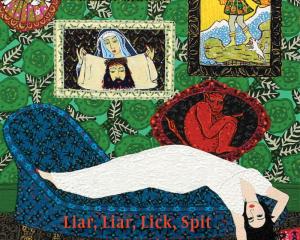
The Secret Life looks at the challenges to our consciousness and integrity from the cyberworld we inhabit.
THE SECRET LIFE
Andrew O’Hagan
Faber and Faber
By PETER STUPPLES
This is non-fiction written as if it were fiction, as mystery, but as a who-is-it rather than a "who dunnit?". The three "stories" that make up the book focus on the ailments of the web, the challenge to our consciousness and integrity from the cyberworld we inhabit, whether we like it or not, more and more of the time as we edge towards the 2020s.

The first of three "stories", published in the London Review of Books in March 2016, recounts O’Hagan’s experience over the months he ghosted Assange.
He began as an admirer both of Assange and the quest of WikiLeaks in exposing corruption and dissimulation at the heart of contemporary international politics, military operations and high finance. For O’Hagan, Assange was the heroic hacker, a cyber David against suit-wearing Goliaths.
On closer acquaintance, O’Hagan found Assange an enigma of great energy and a knight in algorithmic armour, but with a manic desire to be centre of the universe, to be admired by cyber-wise sycophants. The court of Assange was wildly anarchic, despite the hero having almost daily to report to the British police while on bail for the alleged rape of two women in Sweden.
He agreed to provide O’Hagan with copy for his "autobiography", but when the publishers had signed up rights for the work around the world, Assange refused to stay still long enough to answer even the most simple questions about his life, evaded all central topics of interest and eventually reneged on both writer and publisher.
What O’Hagan ends up with, despite hours of recorded conversations, is a somewhat soiled white sheet left behind by a fleeing ghost who was obliged to take refuge in the Ecuadorian embassy in London after breaching his bail. There he resides like a caged lion who has lost his place in the pride.
The second piece, The Invention of Ronald Pinn has also been previously published in the London Review of Books (in January, 2015).
Here, O’Hagan takes the identity of a man who had died some years previously and demonstrates how, by using some of the sites on the "dark web", it is possible to gain a birth certificate, a bank account, a passport, order drugs and even apply for a loan from a bank for somebody who is no longer alive.
Indeed, it appears that a great many "people" who exist on the web do not exist in reality — there is a large population out there of ghosts, some of whom have "friends" and send messages to each other.
The third part of the book documents O’Hagan’s attempts at a biography of Craig Wright, who is or is not the founder of bitcoin, and has also been published previously, in the London Review of Books, in June 2016. Wright, an Australian, is a brilliant mathematician and computer programmer but, like Assange, was on the run from the police, this time for alleged tax evasion in Australia.
In late 2015 O’Hagan, then in London, was contacted by a lawyer in the United States offering him a contract to write the biography of Satoshi Nakamoto, the creator of the bitcoin protocol.
Nakamoto’s identity "was one of the great mysteries of the Internet".
The genesis block of code for bitcoin was "mined" by Satoshi in January 2009 but he disappeared from the web in 2011, sparking a hunt for the "real" Satoshi.
The men behind the invitation to O’Hagan to write the biography believed that one of the prime candidates for the "real" Satoshi was Craig Wright and hence, when Wright appeared in London on the run from Australia, O’Hagan was put in touch with him.
They met often during the period leading up to the moment when Wright was to operate the genesis block, thus proving his identity as Satoshi, on which hung a number of deals among the bitcoin priesthood.
The account is complex, confusing, mystifying and ultimately remains so.
O’Hagan was thwarted as much in this endeavour as he was in the ghosting of Assange.O’Hagan’s central thesis is that the facts of these stories are, as often as not, fiction: "The people I write about tend to inhabit a reality that they make for themselves or that in other ways consorts with fiction, and one is required to enter their ether and dance with their shades in order to write a story."
Or not. Perhaps O’Hagan is too eager to enter their ether and dance with their shades rather than using the more banal language of plain reporting and well-ordered documentation.
Certainly, there is a warning here. Don’t believe all that is written on the web: caveat lector.
- Peter Stupples teaches at the Dunedin School of Art.
Win a copy
The ODT has three copies of The Secret Life, by Andrew O’Hagan, to give away courtesy of Faber and Faber. For your chance to win a copy, email books editor shane.gilchrist@odt.co.nz with your name and postal address in the body of the email, and "Secret Life" in the subject line, by 5pm on Tuesday, August 15.
LAST WEEK’S WINNERS
Winners of last week’s giveaway, The Teenagers, by Chris Brickell, courtesy of Auckland University Press: Ellen Walters, of Dunedin, Chris Yarnton, of Oamaru, Gavin King, of Portobello, Diane W. Potter, of Dunedin, Mavis Turnbull, of Mosgiel.
Comments
What if everyone on the Net was simulacra? Track 'em, Dano. Yaboo is automated. This year, Yaboo Groups were open to Google Search. There was no one to contact about their insecure system. Are SysOps 'bots?
A Facebook user page was found not to exist. Someone had registered for a one off comment, then deactivated. Not to mention the linear outrage if someone's style is obliquely impressionist. The experimenter is not mendacious. The experimenter is authentic. Simulacra is sneaky and covert.












